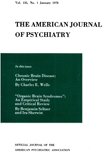THE PREDICTIVE VALUE OF THE BRIEF PSYCHIATRIC INTERVIEW
Abstract
The validity of predictions based upon the brief psychiatric interview has often been challenged. The present study reports 944 cases of naval personnel interviewed because of suspected neuropsychiatric symptomatology. On the basis of a brief psychiatric interview, these cases were separated into 3 classes—mild symptoms, treatment not indicated; moderate symptoms, shore duty indicated; and severe symptoms, hospitalization indicated. The subsequent naval careers of these 944 men were studied for one year. The neuropsychiatric discharge rates for the 3 groups during that year were in accord with the original prediction. The "mild" group lost 6.5% for neuropsychiatric reasons, the "moderate" group 20.2%, the "severe" group 89.7%. These data demonstrate the validity of the brief interview as a classificatory procedure.
Access content
To read the fulltext, please use one of the options below to sign in or purchase access.- Personal login
- Institutional Login
- Sign in via OpenAthens
- Register for access
-
Please login/register if you wish to pair your device and check access availability.
Not a subscriber?
PsychiatryOnline subscription options offer access to the DSM-5 library, books, journals, CME, and patient resources. This all-in-one virtual library provides psychiatrists and mental health professionals with key resources for diagnosis, treatment, research, and professional development.
Need more help? PsychiatryOnline Customer Service may be reached by emailing [email protected] or by calling 800-368-5777 (in the U.S.) or 703-907-7322 (outside the U.S.).



